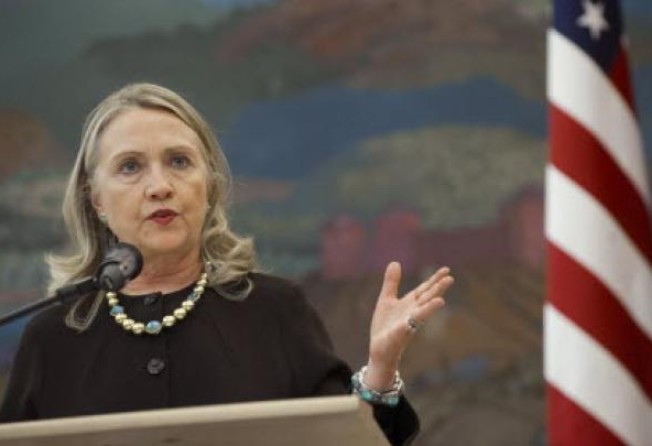Clinton says Kosovo independence ‘not up for discussion’

US Secretary of State Hillary Clinton on Wednesday said that Kosovo’s unilaterally declared independence, fiercely opposed by Serbia, was not debatable and urged their leaders to show “courage”.
“We will oppose any discussion of territorial changes or reopening Kosovo’s independent status. These matters are not up for discussion,” she said, reiterating Washington’s strong support for Kosovo’s ethnic Albanian authorities on a visit to Pristina.
The disputed status of Kosovo is the main bone of contention still affecting regional ties after the break-up of the communist former Yugoslavia, which collapsed in a series of bloody wars in the 1990s.
After meeting with Kosovo President Atifete Jahjaga and Prime Minister Hashim Thaci, Clinton told reporters that European Union membership -- dependent on improved ties between Kosovo and Serbia – offered “the surest path to long-term stability, prosperity and peace”.
EU-brokered talks that stalled after Serbian elections in May had been meant to ease daily life for the inhabitants of Kosovo, ethnic Albanians and Serbs alike, who face many administrative hurdles because of the disputed status of the territory.
“The United States urges all parties to continue to work to implement the agreements reached to date, reach agreements in new areas, and advance concrete measures to normalise relations,” Clinton said.
“It calls for political will, even courage, but by moving forward on this path Kosovo and Serbia will be aided in their efforts to tackle other urgent matters like strengthening their economies and creating opportunities for their people,” she added.
Kosovo could take a first step towards joining the EU in the first half of next year if it makes solid progress in the rule of law, protection of minorities and other political reforms.
Washington is one of the main supporters of Kosovo’s independence, which it unilaterally proclaimed in 2008.
It is recognised by some 90 states including 22 of the European Union’s 27 members but is rejected by Serbia.
Many ordinary Kosovans are still wary of any negotiations with arch foe Serbia and Kosovo saw violent protest last week after Thaci met his Serbian counterpart Ivica Dacic in Brussels to re-launch the talks.
Thaci on Wednesday pledged Kosovo’s commitment to the talks.
“The dialogue is the only path that leads to the European Union ... The normalisation of the relations between the two countries is in the interest of Kosovo, Serbia and the region,” he said in a joint press conference with Clinton.
Clinton also said that the US wanted to see the rule of law “extended throughout Kosovo”, in a reference to majority-Serb northern Kosovo where the ethnic Albanian authorities have no influence and Serbia maintains parallel institutions. However, she urged the ethnic Albanian government to take into account the fears of the Serb minority.
“Addressing the concerns of the Kosovo Serbs will also be critical,” she said, adding that she would meet a group of Serb returnees in Kosovo later on Wednesday.
Kosovo has a minority of some 120,000 ethnic Serbs of whom 40,000 live in northern Kosovo which has its own municipalities, schools and hospitals supported and paid for by Serbia while the Pristina authorities wield no power in the region that borders Serbia proper.
Talks between Belgrade and Pristina were launched in March last year under EU auspices but were suspended for several months after elections in Serbia in May that were won by nationalists.
Brussels has stressed that progress in the talks is a key factor if Serbia, which won EU candidate status in March, is to move forward and open full accession talks.
Clinton came to Kosovo from Serbia, where on Tuesday she also pushed Belgrade to normalise relations with Kosovo, even without recognising the independence of the breakaway territory.
From Kosovo Clinton travels to Croatia -- due to become the EU’s newest member in July next year -- and Albania. Both joined the NATO transatlantic military alliance in 2009.
Of the six ex-Yugoslav republics, only Slovenia has joined the European Union in 2004.